Kuaishou: The financial sector is not as easy as having a 'bowl' to eat from
![]() 08/09 2024
08/09 2024
![]() 556
556

The 'leverage temptation' brought by finance is irresistible, but whether 'collecting seven can summon the dragon' remains uncertain for Kuaishou, and ultimately, it may summon a dragon slayer instead.
Author | Chen Jie
Editor | Liu Shanshan
'The end of the universe is Tieling, and the end of the internet is lending.'
For Kuaishou, with hundreds of millions of users, no matter how difficult the path to finance may be, it must continue forward.
Recently, Chengdu Kuaigou Technology Co., Ltd., which is 100% controlled by Beijing Kuaishou Technology Co., Ltd., wholly acquired Hainan Zhonghe Yunlian Technology Co., Ltd. Prior to this, Hainan Zhonghe Yunlian Technology was the controlling shareholder of Shanghai Shengda Insurance Brokerage Co., Ltd.
This means that Kuaishou has added another insurance brokerage license to its financial landscape.
Four months ago, Kuaishou also acquired a network microloan license. Guangzhou Huaduo Network Technology Co., Ltd. transferred 100% of its equity in Guangzhou Huanju Microfinance Co., Ltd. to Kuaishou's subsidiary Beijing Yunche Technology Co., Ltd., and the company was renamed Guangzhou Kuaishou Microfinance Co., Ltd.
Kuaishou, which had been 'running naked' all the way, finally obtained an entry ticket to internet finance. Industry insiders believe that obtaining this microloan license will rewrite Kuaishou's financial business, which has been stuck in the role of facilitating loans for others.
After multiple layouts, can Kuaishou successfully partake in the financial sector?
01
The Financial Sector
Is Not As Easy As Having a 'Bowl' to Eat From
Since Cheng Xiaoyao took over from Su Hua, Kuaishou's financial expansion has been vigorous. Prior to this, although Kuaishou had long regarded finance as an important part of commercialization, this path was still difficult to traverse.

As early as the rise of internet microloans in 2017, Kuaishou CEO Cheng Xiaoyao applied to register the 'Laotie Finance' trademark, involving services such as electronic transfers, credit card payment processing, financial information, financial assessment, and financial loans.
Subsequently, starting from 2020, Kuaishou successively applied for trademarks such as 'Laotie Payment', 'Laotie E-commerce', 'Laotie Strict Selection', etc., involving online banking, insurance information, financial management, credit card payment acceptance, and other services. In November 2020, it acquired the payment institution Yilian Payment and obtained the first 'Dragon Ball' – a payment license.
Unfortunately, after four years, Kuaishou still failed to launch 'Laotie Payment'. Why, despite having a license, has Kuaishou Payment not yet been implemented?
This is related to the gradual tightening of financial license issuance by regulatory authorities in recent years.
For internet finance companies, the most valuable financial licenses are seven in total: banking, insurance, funds, securities, consumer finance, third-party payment, and online microloans. Among them, consumer finance, funds, and securities are difficult to obtain, and collecting these 'seven Dragon Balls' is the dream of all major companies.
There are two ways to obtain 'Dragon Balls': one is through application, and the other is through acquisition. The application process is slow, and some licenses are shelved and no longer issued. Direct acquisition is the most direct and fastest method for companies with ample funds.
However, after 2020, regulatory authorities have been particularly cautious in reviewing acquisitions of licenses by major companies, including Kuaishou's acquisition of Yilian Payment. Some media reports claim that this acquisition has not yet been approved by regulatory authorities.
Therefore, as of now, the 'buy now, pay later' feature in Kuaishou Wallet can only facilitate Alipay and WeChat Pay.
Judging from the orders placed on the Kuaishou Mall, the only payment channels are 'Alipay', 'WeChat Pay', and 'UnionPay'. In other words, Kuaishou's e-commerce still lacks an online and offline payment closed-loop.
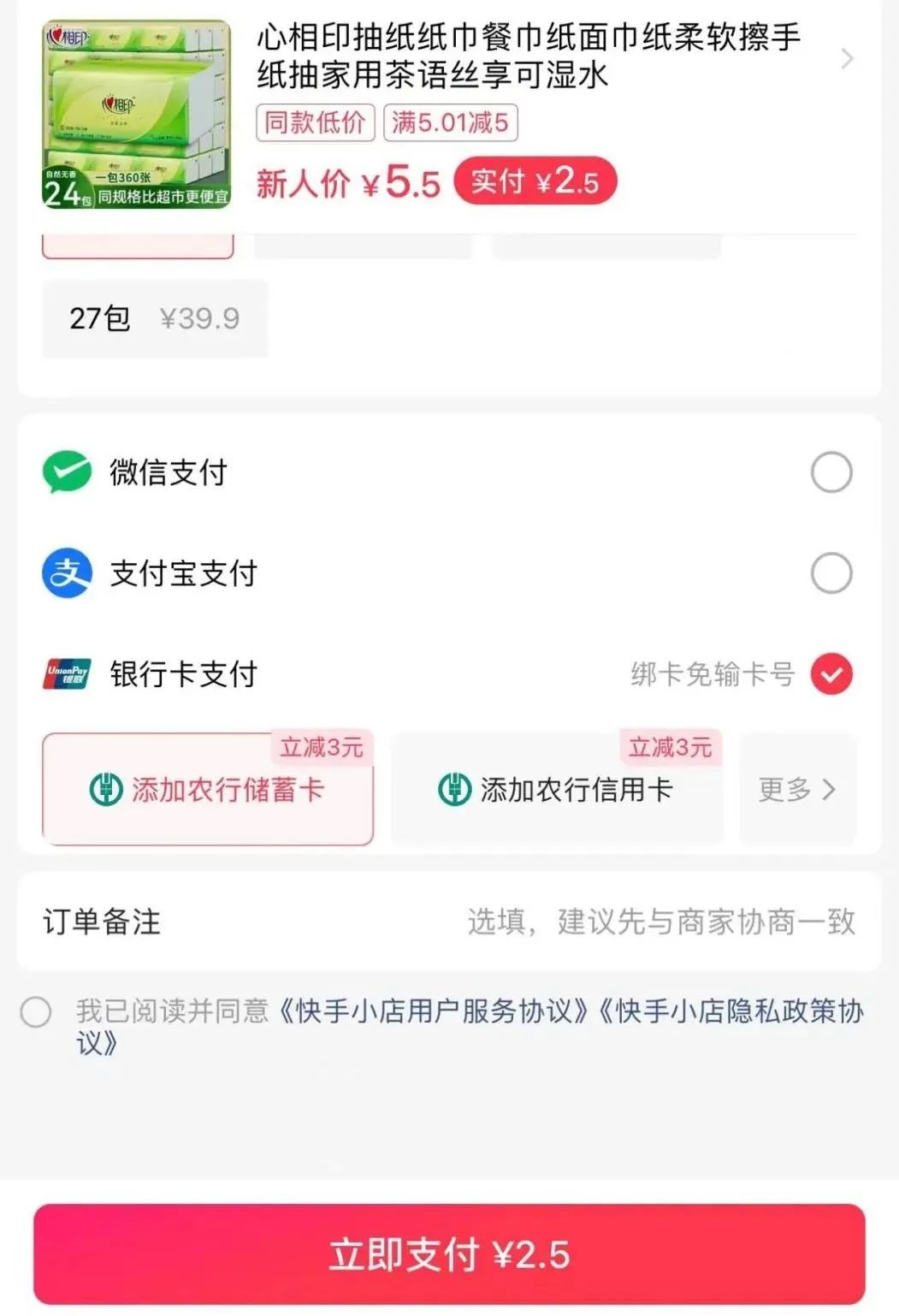
Compared to Douyin's recent completion of an online and offline payment closed-loop with significant investment, Kuaishou's e-commerce live streaming business ecosystem has yet to close, retaining traffic and users within the platform.
From obtaining the 'Laotie Payment' license to actually participating in the financial sector, there are still many variables involved.
Similarly, the 'lending' sector is not as easy as having a 'bowl' to eat from.
High leverage means constantly hovering on the edge of regulatory red lines. Even if Kuaishou currently only serves as a referral platform, it cannot completely absolve itself, as it has already 'speculated' by providing a 'dining venue' for others before even sitting down at the table, with negative user feedback spilling over onto Kuaishou.
Currently, on the 'Wallet' page of the Kuaishou app, the 'Borrow Money' section remains in the role of facilitating loans for third parties, showcasing five third-party lending service providers: Yangqian Guan, Shengbei, Haohui Jie, 360 Credit, and PPDai.

A common feature of these five products is that the maximum loan amount is 200,000 yuan, with varying loan ranges based on individual qualifications. Borrowers must be 22 or 23 years old or older, and loan approvals are quick with high approval rates. The maximum loan term is 24 months, with the shortest option being three months of repayments in installments.
From testing, clicking 'Apply Now' automatically links to the corresponding platform to complete subsequent loan steps. Kuaishou serves only as a loan information display platform, and the loan products are independently operated by the loan service providers. Kuaishou does not participate in the actual operation of loan products or services.

These five lending platforms partnered with Kuaishou have contributed over 120,000 user complaints on Heimao Complaints.

The number of complaints for Yangqian Guan, Shengbei, Haohui Jie, 360 Credit, and PPDai are 8,651, 28,074, 677, 36,044, and 46,992, respectively. PPDai has the highest number of complaints, mostly related to high interest rates, lack of transparency in interest rates, and aggressive collection practices.
Currently, Kuaishou's loan service does not display the 'annualized interest rate,' and links to third-party platforms (except for 360 Credit) do not clearly indicate the interest rate range. This deliberate concealment has angered many users, with several claiming that some loan interest rates on the Kuaishou platform have reached as high as 36%.
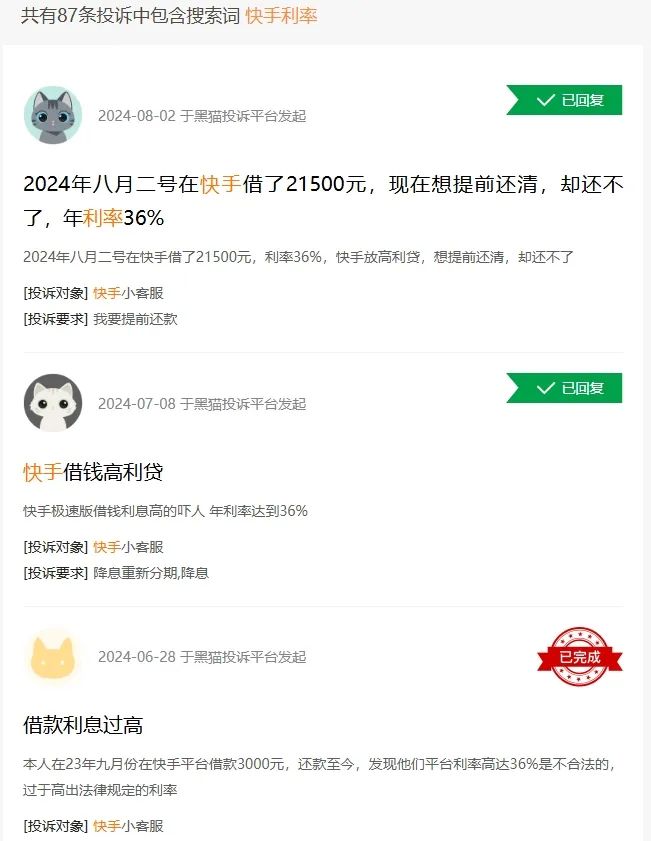
This figure represents the ceiling for lending interest rates across platforms. It's worth noting that Jiebei's annual interest rates range from 3.65% to 21.9%, which is already pushing the regulatory red line.
02
The Payment War
The Most Important Battle in Internet Finance
Since this path to finance is fraught with difficulties, why are major companies still deeply entangled in it?
'When you're studying an industry, others are already using finance to control it.' The 'leverage temptation' brought by finance is irresistible to anyone.
2013 is considered the first year of internet finance. The emergence of Yu'ebao marked the beginning of a new era. Relying on big data, rapidly rising e-commerce and internet companies ventured into the financial industry, developing cross-border big data financial services. Traditional finance was impacted, and the financial industry underwent a 'reshuffle.'
Just as Tencent initially aimed to 'sneak attack the payment Pearl Harbor' with WeChat Red Packets, the power of internet finance is astonishing because it sheds the fancy garb of traditional finance and quietly enters ordinary households, subtly changing our lives.
WeChat's social effects are 'terrifying,' fitting perfectly with the interactive effects of internet finance. 'Just like social networks, users are influenced by those around them, leading to an ever-growing number of users.'
Finance + Social = Terrifying.
The payment war is the opening salvo and most crucial battle in the internet finance war.
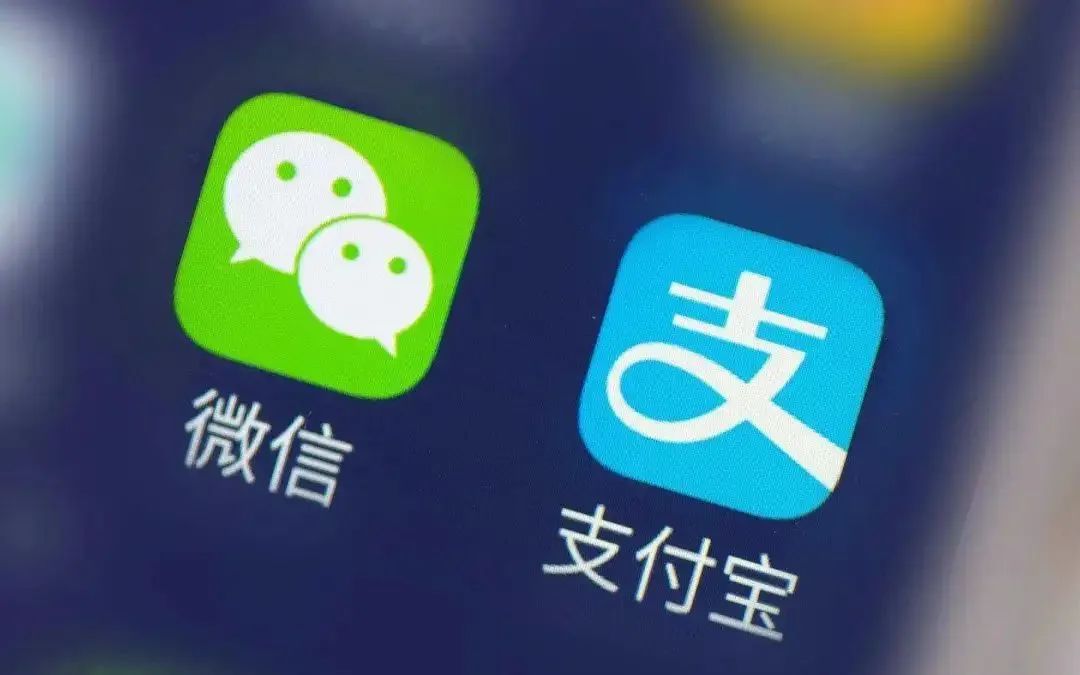
In March 2017, Hupan College opened its doors. At that time, Jack Ma had just endured a Spring Festival overshadowed by 'WeChat Red Packets.' But he soon realized that this was not just a payment war; the greatest value lay beyond payments. 'WeChat Red Packets did indeed knock us on our backs. However, upon reflection, social media might not truly bring value to the company. What brings value is data.' The user behavior data generated by transactions is the true high ground to be captured.
'The war waged by internet giants over payments is essentially a struggle for the future of mobile internet,' according to the book 'Ant Financial: From Alipay to the New Financial Ecosystem.' 'Mobile payments are seen as one of the largest entry points for mobile devices. As application scenarios increase, mobile payments infiltrate every aspect of people's lives, meaning that securing payments largely secures users.' Therefore, mobile payments have become a 'must-have' in the internet finance war.
With their vast traffic inlets, internet giants provide ample room for internet finance to flourish and nourish various organizational structures, truly constructing a vibrant business ecosystem.
Su Hua, the founder of Kuaishou Technology, once said, 'Attention is the core resource of the internet,' which is the power of Kuaishou to 'be seen.' However, if this power cannot flow, it's like admiring flowers in a mirror – visible but untouchable.
Kuaishou has the traffic, but it lacks the 'monetizer' to stir up the spring waters.

'Monetizing traffic is Kuaishou's primary challenge, and finance and advertising are common ways to monetize traffic,' directly stating the reason for Kuaishou's choice of the financial path, according to renowned economist Pan Helin.
Beyond connecting its own platform, third-party payments have evolved beyond initial internet payments. With the infusion of social networks and local life, they now cover both online and offline scenarios, integrating online payments with e-commerce and further segmenting and imagining offline payment applications.
Conversely, payments can also help companies reach offline markets from online spaces, tightening the connection between the internet and offline businesses due to finance.
Nowadays, as the competition between Douyin and Meituan intensifies in the local life sector, local life has gradually transcended its original definition. Its immense economic benefits have made it a must-win territory for internet giants.
According to Kuaishou's 2023 financial report, e-commerce GMV grew by 29.3% year-on-year in the fourth quarter, reaching 403.9 billion yuan, with annual GMV exceeding 1.18 trillion yuan. Daily payment users in the local life business increased by over 40% quarter-on-quarter in Q4 2023, demonstrating robust growth momentum.
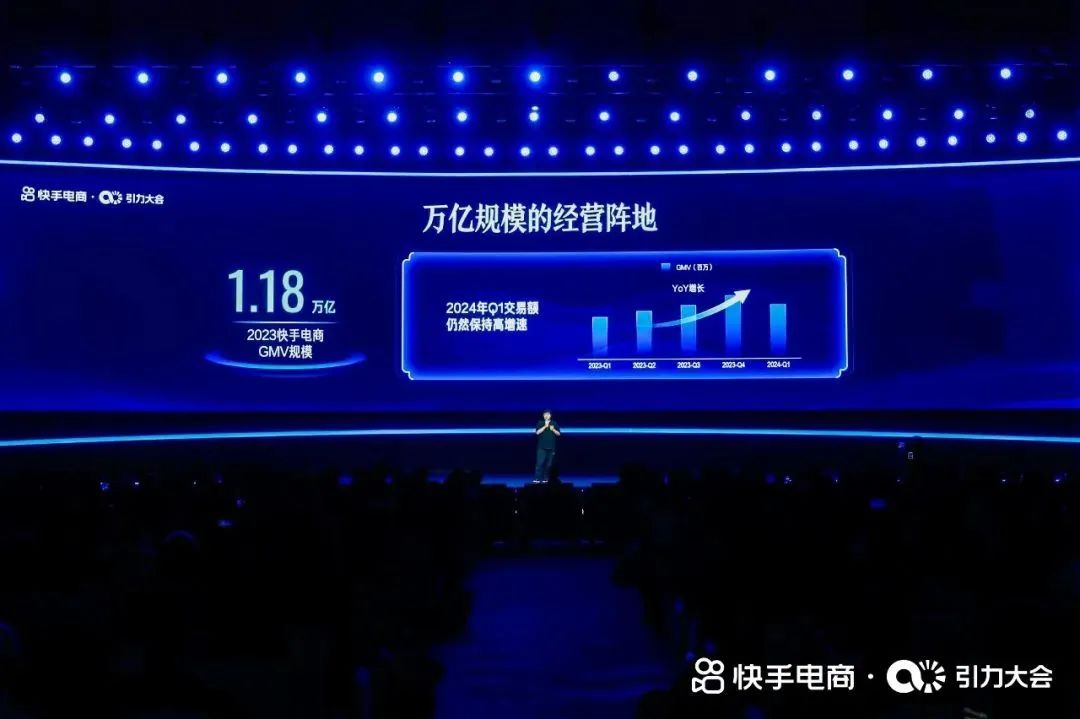
With strong growth in both online and offline businesses, one can't help but imagine that Kuaishou's 'long-awaited' growth would be astonishing if it could only secure a share of the payment pie.
Regardless of whether Kuaishou intends to leverage the immense power of 'platform finance,' there are pressing objective reasons for it to act now. In the payment sector, Kuaishou has been 'facilitating loans for others,' feeling a sense of helplessness akin to working for a landlord.
E-commerce requires secure and efficient settlement payments to handle and digest massive transactions, and lacking a payment license easily breaches the red line of 'secondary clearing' explicitly prohibited by the People's Bank of China. Frustratingly, for every 100 yuan earned by Kuaishou, it must pay up to 1.7 yuan in transaction fees to third-party payment providers.
According to Kuaishou's financial report, its total e-commerce GMV reached 1.18 trillion yuan in 2023, with payment channel fees amounting to 2.569 billion yuan, up 32.42% year-on-year from 1.946 billion yuan the previous year.
The harder you work, the higher the landlord's pension.
03
Collecting Seven Can Summon the Dragon?
Payments and lending are the two hands of the internet grabbing money. They are also the two major landscapes of Kuaishou's financial layout.
The poor will never catch up with the speed of money making money, 'The simplest way to make money in the world is to use money to make money, so most companies eventually turn to finance.'
As previously mentioned in 'Alipay: Unable to Let Go of Content Obsession, Unable to Shed the Financial Armor,' no one expected that 'using Huabei more often' would lead to a trillion-yuan valuation for this financial technology giant.
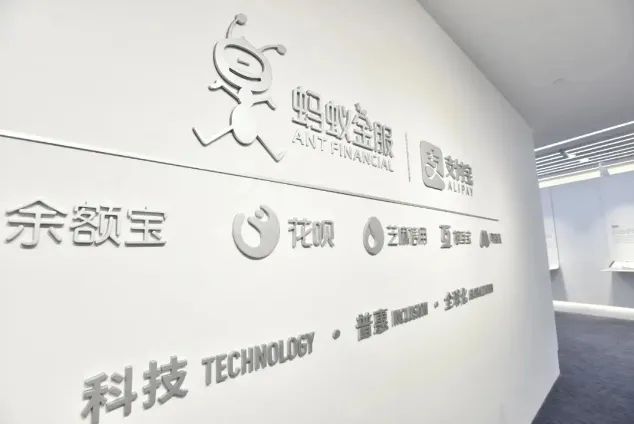
Based on big data credit reporting and risk control systems, as well as internet lending models, traditional financial restrictions have been perfectly resolved for small and micro-enterprises financing and individual online loans. Without the constraints of traditional banks, internet microloans have taken off directly. On the eve of its IPO, Ant Group was valued at up to 2.1 trillion yuan, hailed as the world's largest unicorn.
Today, various apps are filled with loan application entry points, and short video platforms with the strongest traffic are undoubtedly the easiest to deliver loans.
Verified success paths and platform advantages have placed many expectations on Kuaishou.
According to Kuaishou's financial report, the platform's user base and social interaction atmosphere continued to strengthen in 2023, with the average monthly active users in the fourth quarter increasing by 9.4% year-on-year, surpassing 700 million for the first time. With a user base of 700 million dominated by users in lower-tier markets, the potential impact of Kuaishou's lending business is immense and difficult to imagine.
"Having a license is not only a boost for its investors and the secondary market, but also enables Kuaishou to expand its self-operated consumer finance business," said industry insiders, expecting Kuaishou to accelerate its moves. Financial technology expert Su Xiaorui added, "After obtaining a small loan license, Kuaishou is expected to venture into consumer finance, packaging its offerings into loan products such as Kuaishou Installment Plan or credit payment products like Kuaishou Monthly Pay, following the established paths of internet traffic giants, thereby seeking greater growth in the financial sector."
However, at present, Kuaishou Pay, online micro-lending, and the recently acquired insurance license are still in the landing phase, with a long way to go before they become operational.
Regulators have been hesitant to approve payment acquisitions, and even basic payment services remain uncertain. This raises concerns about the prospects of Kuaishou's micro-lending and insurance businesses.
Yet, for Kuaishou, there may be more pressing concerns than mere operationalization.
High profits are often accompanied by risks.
Ant Financial Group learned this lesson the hard way when its IPO was abruptly halted on the eve of listing, preventing the "elephant" from being broken down into smaller pieces. Regulatory red lines can tighten the purse strings of platforms at any time.
Even in its current landing phase, Kuaishou finds itself in a "crisis-ridden" situation.
Although Kuaishou serves merely as a "transit station" for lending, media reports have suggested that it engages in "double-dipping," providing loan referrals to financial institutions and loan facilitation platforms while also offering services to borrowers with overdue online loans.
These so-called "services" refer to the rapidly growing black industry and current "hot spot" known as "anti-collection."
Against the backdrop of "aggressive debt collection," the business of "anti-collection" emerged. On various platforms, a search using keywords like "debt collection/anti-collection, debt optimization" reveals numerous videos and live streams of similar nature. Comments under these videos often contain pleas for help from borrowers with overdue loans.
When searching for "anti-collection" on the Kuaishou platform, although a prompt appears advising users to handle debt and credit issues through legal means, a significant number of related videos still appear. Among them, a blogger named "Yege Consultation" is prominently featured.

Under a video titled "Anti-Collection is Illegal," multiple pleas for help from overdue borrowers can be found, asking about the consequences of secondary credit card default negotiations and the possibility of property being seized for a nearly RMB 100,000 secondary default on Alipay.

These groups exploit borrowers' fears and anxieties about overdue loans, attracting clients and inciting them to file malicious complaints, engage in paid complaint representation, or negotiate repayment plans, ultimately aiming to reduce interest, principal, or even seek compensation.
According to Kuaishou staff, "Most of the content from these accounts is mass-produced using templates, and sometimes the videos and live streams do not even feature the same person. These groups ostensibly disseminate knowledge but essentially profit through paid memberships and paid courses."
The platform's algorithm becomes a tool for them to target precise audiences.
However, some groups go beyond earning commissions from borrowers, engaging in "double-dipping" by repeatedly exploiting both debtors and creditors by reselling user data and offering anti-collection countermeasures.
Although Kuaishou officially launched a "special rectification campaign against paid anti-collection content" as early as June 2020, and achieved notable results half a year later with 1,989 violating accounts disposed of, including 559 permanently banned, such content still seems to be resurfacing, raising doubts about Kuaishou's stance on the matter.
Apart from anti-collection, repayment rates pose another crisis for Kuaishou.
According to the 2019 "Report on the Debt Status of Young Consumers in China," the overall penetration rate of credit products among young people in China has reached 86.6%, with approximately 44.5% of young people actually in debt. Nearly half of young people are living on "tomorrow's money."
Trapped in this cycle, they rely on borrowing to repay loans, sinking deeper and deeper. Amid the economic downturn in recent years, the repayment rate of micro-loans has shown a declining trend. Compared to other platforms, Kuaishou's repayment rate is even more concerning, with some media outlets previously reporting that "Kuaishou's clients lack sufficient repayment ability."
Judging from Kuaishou's target market, this is not surprising. Its user base primarily comprises low-income, young, and less educated individuals from third- and fourth-tier cities, rural areas, and middle school students, who tend to have weaker financial risk resistance.
This implies that Kuaishou's financial operations face more risks and challenges than those of larger companies.
Various signs indicate that while Kuaishou has ambitions to make money, it has not provided a healthy lending environment for its users. If Kuaishou launches credit payment products like "Laotie Payment" or "Kuaishou Monthly Pay" in the future, it will undoubtedly offer consumers more convenience and payment options. However, concerns arise over the safety and compliance of Kuaishou's lending products in a market of 700 million users. Establishing a risk-resistant credit system and regulating product interest rates and repayment rates are issues that Kuaishou cannot avoid.
"Collecting seven items may summon a dragon," but for Kuaishou, this remains uncertain, and the dragon summoned could just as easily be a dragon slayer.
END
Producer: Huang Qiangqiang







